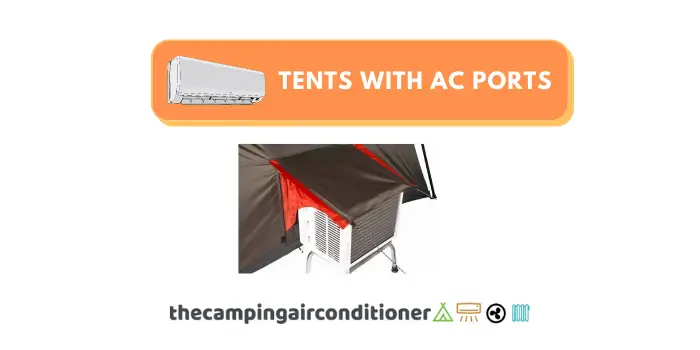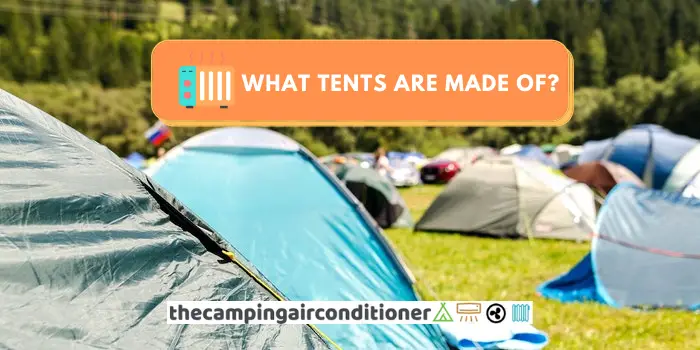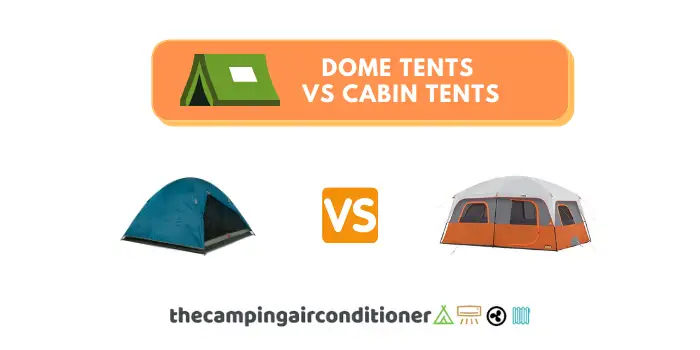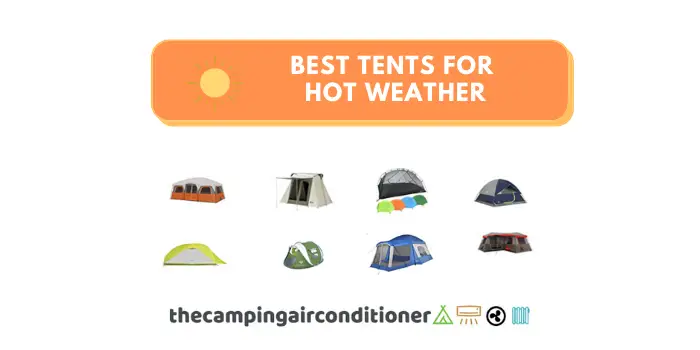Camping has always been a staple in my life. I try to take a camping trip every month or two, even if it’s just for a couple of days. Since I camp so often, I’ve had the pleasure of experiencing a range of climate and environmental conditions ranging from camping on the beach in the winter to more remote locations in the hot summer months.
And one thing I noticed whenever I was in a humid area was that condensation would always build up in the tent. This was not fun at all, as my quiet night’s sleep would constantly get ruined due to extremely humid and unpleasant air.
That’s when I tried to see if a dehumidifier would work in my tent. After all, if I could find anything to eliminate condensation while camping – I would definitely make use of it. So, do Dehumidifiers work well in a tent?
I learned that yes – dehumidifiers are actually a pretty efficient way to eliminate condensation in your tent while camping!
In this article, I’ll further explain how dehumidifiers work in tents and why condensation happens in the first place. After that, I’ll suggest to you a couple of tent dehumidifiers you can use on your next camping trip.
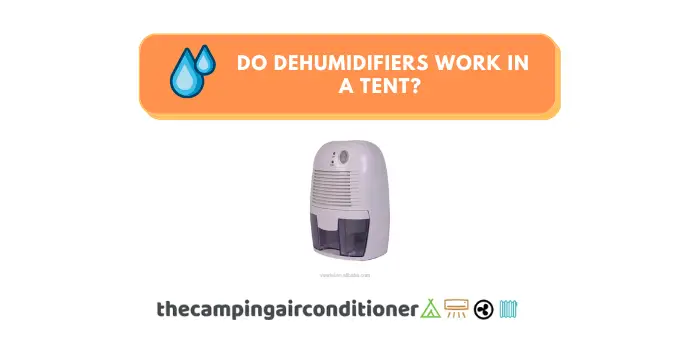
By the way, The Camping Air Conditioner is sponsored by readers. When you buy through one of our links, we may earn an affiliate commission at no extra cost to you.
Tent Dehumidifiers – Summary Review
In a hurry? Here are the top 3 tent dehumidifiers that I particularly like.
Not every camper has the same needs. While some campers enjoy camping with their family in their large tent, other’s prefer to go solo. And as a result of that, depending on the type of camper you are, you will need a slightly different model to suit your needs.
For instance, if you’re out camping alone, I’d suggest you go for the Afloia Mini Dehumidifier. If you’re camping with your family and need a more comprehensive dehumidification unit, you can’t go wrong with the Pro Breeze or the Eva-dry.

- Very easy to use
- 100% cordless
- Small and portable design
- Battery lasts for a few days

- 360-degree circular air inlet
- Removes up to 4oz/100ml of moisture
- 54 square feet range
- No battery or electricity required
Will a Dehumidifier Work in a Tent?
Camping in a humid area is tougher than you can imagine, and one of the reasons for this is the constant build-up of condensation in the tent.
If you have to deal with condensation in your tent whenever you go camping, it can ruin what would have otherwise been a good night’s sleep.
When condensation occurs, the tent can start to feel sticky and uncomfortable, which is something no one wants to experience. Camping is supposed to be fun, relaxing, and therapeutic, so having an uncomfortable tent is something you want to avoid at all costs.
Besides, a high level of humidity can result in your tent building up mold, which will make your tent unsuitable.
There are quite a few things you can do to eliminate condensation in a tent, but one of my favorite methods is using a dehumidifier. Nowadays, there are tons of portable dehumidifiers on the market that allow you to eliminate humidity even when camping at a remote site.
With that said, it’s important to remember that there are quite a few dehumidifiers available on the market today. And if you don’t find the right one, it may not be able to do the job properly. That’s why later on in this article, I’ll suggest to you my three favorite dehumidifiers for camping. But before we do that, let’s take a look at why condensation happens on the first place.
Why Does Condensation Happen?
Condensation commonly occurs while camping whenever warm air touches a cold surface. Similar to how a car window fogs up without proper ventilation, tents can get very foggy and humid, especially under specific conditions. While high levels of humidity aren’t dangerous, when the air is far too humid, it can make your breathing more difficult while in the tent.
Here’s how to prevent condensation in a tent:
- Minimize the sources of additional moisture inside your tent
- Ventilate your tent as much as possible
- Buy a dehumidifier (our preferred way)
The Top 3 Best Dehumidifiers for Tent Camping
Though there are plenty of different ways you can dehumidify your tent, keeping your tent open at night to get proper ventilation isn’t ideal as you’re going to be welcoming a range of bugs and insects inside. Not to mention snakes and other wildlife you want to avoid getting close to – especially when you’re asleep.
So, if you’re like me and want to play it safe, I’d recommend getting a dehumidifier. They’re pretty inexpensive and do the job extremely well. With that being said, you don’t want to buy a unit that isn’t really going to get the job done, so what I’ve done is went out and researched the market and came up with a list of the three best dehumidifiers for camping.
Pro Breeze Dehumidifier - Best for Larger Tents
This mini dehumidifier is a favorite option for frequent campers or those who live in a tent long-term. With that said, this model isn’t for the minimalist camper. This dehumidifier needs to be plugged in, so it’s only available for people who camp with a generator. But while it’s not the most practical option, it’s one of the most functional ones, which is why I made sure to include it as part of this list.
Weighing at just 2.4 lbs, this small dehumidifier is very easy to bring around. So, if you have access to electricity at the camp site, you don’t have to worry about lugging around a battery-powered dehumidifier just for the tent. On top of that, this operates very silently, which means that you don’t have to worry about loud noises interrupting your sleep.
Additionally, this dehumidifier shuts off automatically once it’s water tank reaches its maximum capacity. This is great because you don’t have to worry about the machine overflowing and soaking your camping gear if left unattended. So, not only is it highly effective, but it comes with a ton of practical features as well.
As mentioned earlier, this isn’t for campers that enjoy camping without electricity. However, if you go on long camping trips and make sure you have access to electricity, there aren’t many dehumidifiers on the market that are a better fit for a tent.
- Small and compact
- Removes 9oz of moisture per day
- Ultra-quiet and energy efficient
- Great for larger tents
- Not suitable for solo campers
- Needs electricity to run
- Small and compact
- Removes 9oz of moisture per day
- Ultra-quiet and energy efficient
- Designed by an award-winning brand
Eva-dry Dehumidifier - A Cordless Alternative
This dehumidifier doesn’t have cords. This means you can bring it with you to any campsite and get it working in just a few seconds. On top of that, this model is very simple. You don’t have to press any buttons to get it working. All you have to do is hang it on the tent and it will do all the work for you.
This dehumidifier uses silica beads to absorb moisture from the air. It states that the dehumidifier can last around 30 days without you having to change anything. However, take that with a grain of salt. With that said, even if it only lasts around half that time, it will be good enough to last you for a number of camping trips throughout the year.
Once it inevitably runs out of power, all you have to do is charge the battery up and it will be all ready for your next camping adventure.
- Simple and easy to use
- No wires or cables
- Small and sleek design
- Can cover an area of up to 333 cubic feet
- Not suitable for camping trips longer than 15 to 30 days without power
- Takes longer to dehumidify the air
- Easy to use
- 100% cordless
- Small and sleek design
- Works for areas up to 333 cubic feet
Afloia Mini Dehumidifier - Best for Portability and Convenience
Out of all the models on the market, I found that the Afloia mini dehumidifier was the only one that could strike the perfect balance and contains all the features you need from a camping dehumidifier. What sets this model apart is that it’s rechargeable and on full-charge, it can last up to a couple of days. So, even if your campsite has no power source at all and you can’t access any electricity, you won’t have trouble with humidity while out camping.
If you enjoy packing light and don’t want to overcomplicate things when you camp, this is a great dehumidifier for you as it weighs around 2 lbs. It has a circular design so it can absorb moisture 360-degrees. This makes it very effective and can even be used for larger tents of up to 54 square feet. So, if you’re sharing a tent with a couple of people and want to keep the humidity at the lowest possible level, this model is a great choice.
- 360-degree circular air inlet
- Can remove up to 4oz/100ml of moisture
- Effective in up to 54 square feet of space
- No batteries or electricity is required to run
- Portable and easy to carry around
- Not great for larger tents
- Not suitable for extremely moist environment
- 360° circular air inlet makes moisture absorption more efficient
- Physical dehumidification, no reverse osmosis or accumulation of water
- Removes up to 4oz/100ml of moisture in up to 54 square feet
- No batteries or electricity are required for this wireless dehumidifier to dehumidify
What Makes a Good Tent Dehumidifier?
A good tent dehumidifier is small and portable. Even if you need to plug the dehumidifier into a source of electricity, it’s important to make sure it’s lightweight and easy to bring around. Many modern campsites have electricity, so you don’t need to worry about whether or not you can plug in your dehumidifier, especially if you’re a casual camper.
With that said, if you’re a serious camper who goes to more remote campsites, then you need to find a dehumidifier that doesn’t require electricity or Ideally, we recommend getting a rechargeable option as this will give you a lot of flexibility and most modern models can easily last you a couple of days.
Dehumidifiers are designed to perform a very simple task at your campsite. However, you still have to make sure the model you choose fits the size of your tent and matches your needs.
Will a Tent Heater Stop Condensation in My Tent?
It depends on the model that you use – you can read a detailed explanation in this article, but a quick logical summary is shown below.
Gas heaters (propane, butane, and kerosene models) release water in the air through fuel combustion, which might worsen condensation in your shelter!
On the other hand, electric heaters do not use fuel for heating and do not release water into the air. The trick is that they will increase temperatures, which might induce tent condensation.
So, if you are winter camping and wondering what the best and safest option to avoid condensation is: do not hesitate and pick an electric model.
Conclusion
Dehumidifiers are a great addition to any camping set. They can do wonders for condensation in the tent, especially if you have the right model.
So, next time you pack for a camping trip, you might want to consider adding a dehumidifier to your list of equipment as that way, you’ll be guaranteed to have a much better camping experience, especially during those hot summer months.





